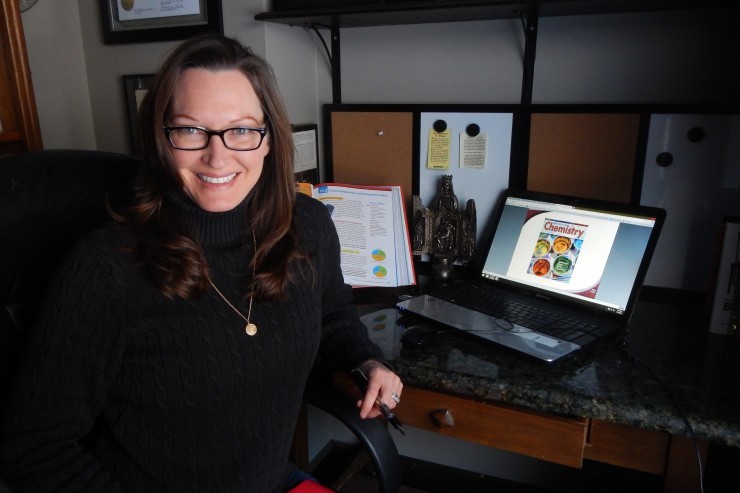“I have an open mind,” of course, has become a cultural cliché. What it really means is, “I am open to any trendy idea that blows in the wind, and am willing to accept it uncritically.”
 My barber is a good man. From what he tells me, he is a faithful husband, a dutiful father, and a loyal friend. He is amiable, remembers my name, and is consistently pleasant. He is, however, a bit loquacious. But that is fine with me. I view it as part of his charm, and a welcomed one at that since it allows me to pass the time in his operating chair as a captive audience of one.
My barber is a good man. From what he tells me, he is a faithful husband, a dutiful father, and a loyal friend. He is amiable, remembers my name, and is consistently pleasant. He is, however, a bit loquacious. But that is fine with me. I view it as part of his charm, and a welcomed one at that since it allows me to pass the time in his operating chair as a captive audience of one.
More specifically, whenever I am patient to his beautifying art, I am invariably entertained by a steady stream of highlights from the world of current events. His most recent tonsorial performance featured some offhand comments about same-sex “marriage.” While he confessed that he is not entirely comfortable with men marrying men and women marrying women, he is, nonetheless, willing to go along with it because, as he puts it, “I have an open mind.”
I make it a point never to argue with anyone who is operating on my head with sharp instruments and electrical devices. It is much wiser to write at leisure for a friendly audience than to speak hastily to a single person and thereby risk losing a valuable ally. So, I chose to let my own stream of thoughts engage my mind and silence my tongue.
A certain Jayne Mugglestone, 35, and a British health worker has been artificially inseminated with the sperm of a homosexual friend. She and her female partner plan to share their parental duties with the child’s biological father and his boyfriend. This four-cornered arrangement may be unconventional, but should we not have an open mind and accept it? How voracious, we might ask, is the open mind? Is there anything it might be closed to? Is there room in its wide, cavernous, yawning openness for a principle that might allow it to reject something?
“I have an open mind,” of course, has become a cultural cliché. What it really means is, “I am open to any trendy idea that blows in the wind, and am willing to accept it uncritically.” There is too much emphasis, unfortunately, on the “I” and none whatsoever on that to which one is open. It is hard for me to hear this tiresome phrase without sensing the presence of too much ego and too little objectivity. “Pride,” as G. K. Chesterton has reminded us, “Is the falsification of fact by the introduction of self.”
An “open door” policy is good. But why have a door at all if it is always going to be open and never closed? Would not a “no door” policy be even better? It is a truism that every door that is made to open is also made to close. Similarly, it is good to keep our eyes open. But the presence of eyelids suggests that there are times when their closing action is not only needed but also necessary.
The completely open-minded investigator would be even more inept that the fabled Crown Prince of ineptitude, Inspector Clouseau. Reason, by nature, is a narrowing activity. Like a good investigator, it begins with a myriad of suspects, but by applying logic to the facts, whittles the list of suspects down to the one person who is guilty. Philosophers have often been compared with sleuths. Their actions are like swords that cut down the many imposters to reveal the unequivocal truth. But what kind of detective is it that proceeds by enlarging the number of suspects? “I have an open mind,” he says, “my job is to increase the number of suspects so that in the end, everyone is equally guilty or equally innocent.” Such is the portrait not of a philosopher or sleuth, investigator or detective, but of a madman.
The justification for having an open mind is not to keep it open until it devours everything and holds on to nothing. Rather, it is to take the first step toward discovering what is true or what is good or what is right. And then, when confronted with the natural object of the mind, it grasps it, apprehends it, comprehends it, or takes hold of it. Thomas Jefferson’s Declaration of Independence would have been an unremembered piece of useless drivel had the third president of the United States said: “We are open to theories about human equality and the rights of every man to life and liberty, but we are equally open to theories of tyranny, oppression, and slavery. In saying, “We hold these truths to be self-evident, that all men are created equal, that they are endowed by their Creator with certain unalienable Rights, that among these are Life, Liberty, and the pursuit of Happiness,” he was echoing the mind of St. Paul who advises us to “Hate what is evil, hold fast to what is good” (Rom 12:9); “Test everything; hold fast to what is good, abstain from every form of evil” (1Tim 5:21); “Hold firm to the sure word as taught, so that he may be able to give instructions in sound doctrine and also to confute those who contradict him” (Tit 1:09).
The human mind has not completed its natural function while it remains in the state of openness. It is only when it closes itself on something true or good or right that it has completed the activity for which it was created. We will never enjoy or share anything of value with anyone unless we first take hold of it. Perhaps I will give my barber a better tip the next time I visit his shop.













